The event of France-Pakistan Gateways Eurasia was held on 18th January 2023 at Davos, Switzerland. It was held under the auspices of the Pathfinder Group, which is also co-hosted by UBank. The event was moderated by Zarrar Sehgal, Chairman Pathfinder Group.
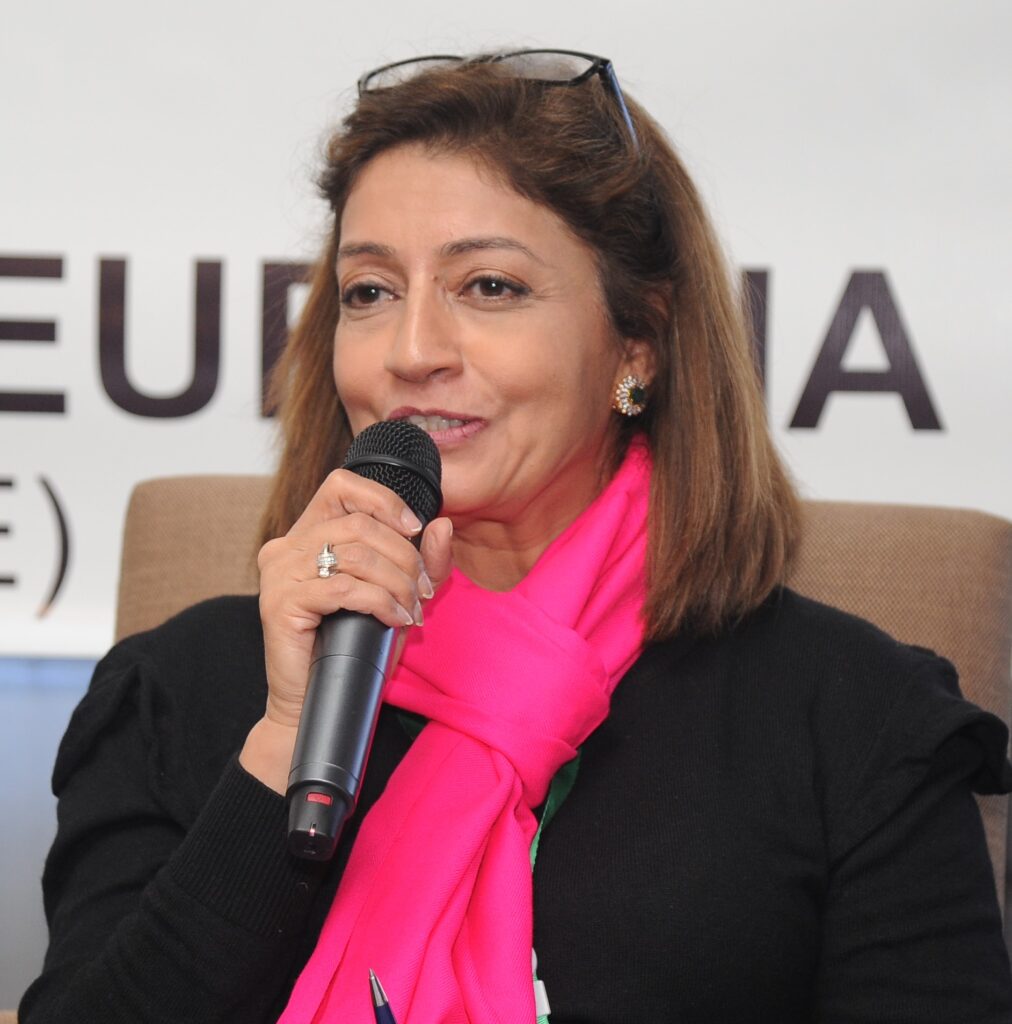
Dr. Huma Baqai – Rector, MiTE: Today, the topic is France Pakistan gateway to Eurasia. It is interesting that Eurasia is the largest continent on the face of Earth, comprising probably of all of Europe and Asia. We have heard a lot about Indo-Pacific, but a lot of people think that Eurasia is going to be much larger than Indo-Pacific and also a game changer. China’s growing gravity across Eurasia was a major theme of 2022, but will it carry through in the coming years?
A report that came out from the World Economic Forum said it won’t be a Chinese year, it will be multi-polar. We have yet to see that. Andrew Small, the author of ‘No Limits: The Inside Story of China’s war with the West’, talks about Moscow in China’s relationship, “that there is just one thing we take care of when we deal with it and that is that we treat Moscow with respect”.
I think it’s not just Moscow, its countries across the globe that want to be treated with respect, and this desire for respect is increasing in the east. Has the fulcrum of growth shifted from the West to the East? We’ve been hearing about it for almost a decade now. Is it playing out into a reality, is yet to be seen. They say perhaps a new cold war is upon us. What is this new cold war? Is this the one we live through? People say it is going to be very different. There is going to be a huge crisscross of geo-economics and geopolitics and the decoupling people think about, is not even an option.
I think it’s not just Moscow, its countries across the globe that want to be treated with respect, and this desire for respect is increasing in the east. Has the fulcrum of growth shifted from the West to the East? We’ve been hearing about it for almost a decade now. Is it playing out into a reality, is yet to be seen. They say perhaps a new Cold War is upon us. What is this new Cold War? Is this the one we live through? People say it is going to be very different. There is going to be a huge crisscross of geo-economics and geopolitics and the decoupling people think about, is not even an option.
A lot of other people are of the opinion, that there can be at best competition between China and the United States of America, there can be cooperation, but confrontation is not an option. However, while all this is happening new blocs are emerging and in this, we have an emerging new theme of geopolitics and geo-economics, and that is in the region – Eurasia.
We have representation from France here, from the Le Havre University, actually who we’re going to call to come and speak about how they see it and is France really, the gateway to Eurasia, and what is the role of Pakistan in all of this.
We have Ambassador Aisha who’s going to shed light on that. So I would now like to invite Air Commodore, Sadeed Malik who is the Secretary General of KCFR and CEO, to talk a bit about KCFR, the organization who’s hosted this lunch for you, so Sadeed Sahab, over to you.”
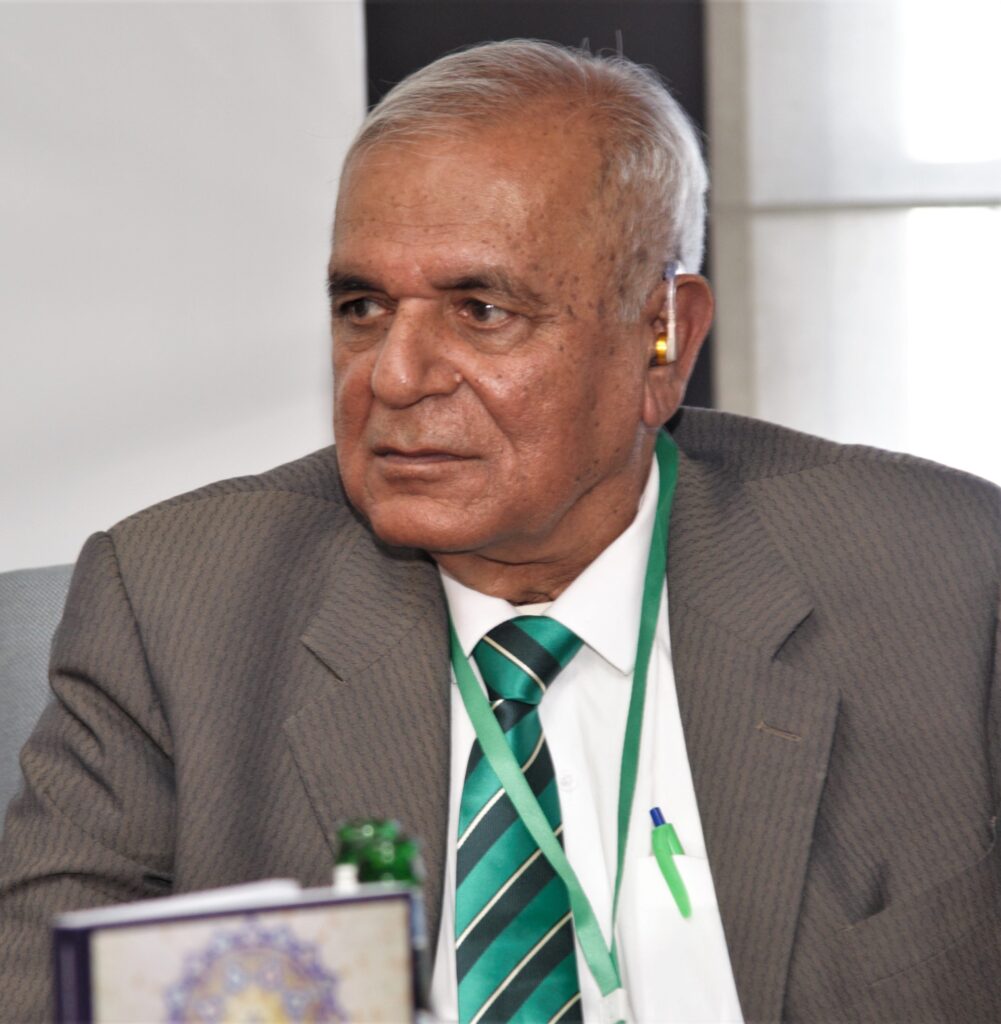
Secretary General and CEO, KCFR, Cdr. Sadeed Malik: Thank you, Dr. Huma Baqai. Assalam-o-Alaikum, Guten Tag, Bonjour, and good morning, or good afternoon. It’s a great pleasure and an honor for me to welcome you all at this august occasion.
Karachi Council on Foreign Relations (KCFR) is a simile of Chicago Council, but that is a century old and we are very young, just about 19 years, we deliberate in the fields of foreign affairs, economic affairs and education, etc.
Our founding Chairman was the Chief Justice, late Chief Justice and then Governor of Sindh, Justice Saeed Uz Zaman Siddiqui, and then we had Chief of Naval Staff who is also an ambassador. Later on, after the retirement, Admiral Shahid Karimullah, after which we had another ambassador, Mrs. Shahid. Then we have our former chairman who is now, our veteran Chief, Mr. Ikram Sehgal, and at the moment our chairman, Admiral Khalid Mir.
We have a few members of the Board of Governors here today. So far, we have had about 300 guests from abroad and local. We publish our thoughts in our journal every six months. One of the prominent people who have addressed us is the President of Pakistan, nearly all foreign ministers and education ministers over the topics that we deliberate.
People from foreign countries whenever they come, they come and discuss with us everything that they have learned about Pakistan. Our members are generally retired ambassadors, retired admirals, generals, air marshals, and prominent individuals like businessmen and investors.
We have recently signed an MoU with a prominent University of France, Université Le Havre, and they are interested to do some work over here, one of our members of the Board of Governors has offered them an area. A very large area for establishing a University where he will construct the infrastructure, the building with provision of furniture etc.
We have now Le Havre University in the academic council, and hopefully soon we will have that university portion in Pakistan too. I may continue for some more time but however, I know we are short of time and if there are some questions later on, we would love to reply to those. Thank you very much.”
Dr. Huma Baqai – Rector, MiTE: “Thank you, Sir Sadeed Malik. I would also like to add. I wear several hats, so one of them is that I’m associated with KCFR, for about 15 years now, but I’m also a rector of a university. A new University that has come up in Karachi, Sindh, which is MITE, Millennium Institute of Technology and Entrepreneurship and we also have the honor of having an MOU with Le Havre University, where exchange students, faculty and other collaborations will happen, and with that I will invite Jean Noel Castorio to come and speak to us.
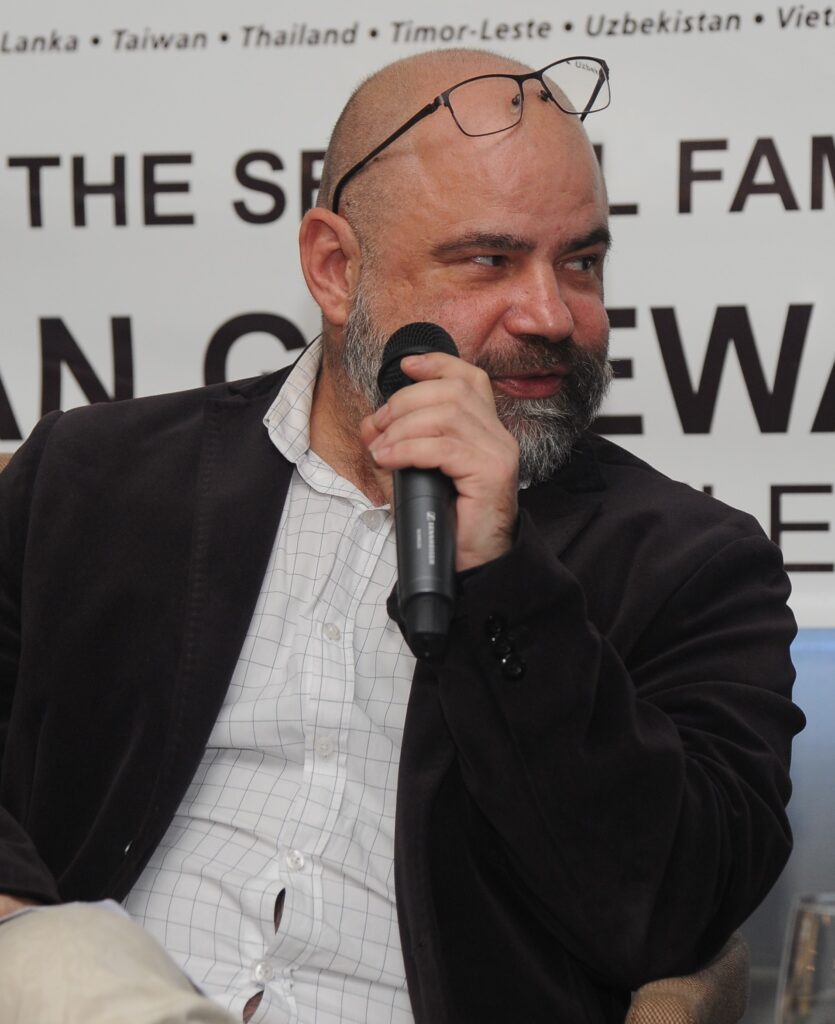
Representative of Le Havre University, Mr. Jean Noel Castorio: First and foremost, let me express my heartfelt thanks to Pathfinder Group, Mr. Sehgal for their invitation. I am truly honoured to speak to this distinguished gathering on behalf of the French university.
As vice-president of the Université Le Havre, I would first like to say a few words about the establishment I am so proud to represent here. The history of our university is closely linked to that of the city around it, Le Havre, which was created from scratch at the beginning of the 16th century by king François 1st, as Paris’s gateway to the ocean – I beg you to forgive me for this short digression as I now realize I should have started by mentioning the fact that I am a professional historian. The city of Le Havre, which was virtually razed to the ground during World War 2, was then totally rebuilt by French architect Auguste Perret. It is now inscribed on the UNESCO World Heritage List for its typical post-war architecture and has established itself as the main French port for goods transport. The city, badly hit by the economic downturn of the 70s, has been back on the road to prosperity over the last three decades: Haropa, the group formed by the ports of Paris, Rouen and Le Havre, is today the fifth largest European port, with two thirds of the container-traffic and over one third of the oil-traffic. The dynamism of the city, epitomised by the figure of its mayor, Mr. Edouard Philippe, who was also Prime minister from 2017 to 2020, is reflected in the industrial facilities recently established by major multinationals such as Siemens and Total Energies, for instance.
Created in 1984, the Université Le Havre has, over the years, become one of the main research centres on port and maritime questions; indeed, it is now the French university with the largest number of researchers working on such issues. Thanks to the Institut Supérieur d’Etudes Logistiques, ISEL (Higher Institute of Logistics Studies), which was founded in 1994, our university trains logistic engineers from the whole world to very high standards.
Opened onto the Atlantic Ocean via the Channel, ULHN has, as it were quite naturally, an international vocation. It has indeed, among French universities, one of the highest proportion of foreign students, 22% as against 13% nationally. For historical reasons, most of those students come from Africa and East Asia – as a matter of fact, Le Havre has the Asian branch of Sciences Po Paris, the prestigious Paris Institute of Political Sciences.
As we all know, 40 is an age when you can start to take stock and also confidently envision future prospects on the basis of previous experience of past successes as well as mistakes. With the support of the Normandy region and its president, Mr. Hervé Morin, and also with the support of Mr. Edouard Philippe, regional and local authorities and the large companies established in Le Havre, ULHN has initiated a deep process of change, which rests on the idea that it is now time for it to assume a new dimension, thus making it both the number-one French university specialising in maritime issues, and more broadly, one of the major European and global universities working on such issues.
This transformation is based on the expertise the university has gained in 3 main domains:
- Maritime and port questions (as previously mentioned)
- Energy transition, especially the development of renewable energy sources and the reduction of greenhouse gas production.
- Urban resilience, a vital question for cities such as Le Havre, faced with the likely prospect of being submerged by the ocean in a not-too-distant future.
For 20 years now, ULHN has been a member of a network of port universities, GU8, which it has the honor to chair; GU8 includes the university of Hull in the United Kingdom, Magdeburg in Germany, Inha in Korea, Xiamen in China, Perlis in Malaysia and Fortaleza in Brazil. The overhaul of our university has been designed together with an overhaul of GU8 around the same topics with a view to making this network of over 160,000 students and 10,000 researchers one of the major global networks specializing in maritime and port research.
By mutual agreement, GU8 member universities have decided to open the network to other international coastal establishments; such an opening is a requirement if GU8 is to reach its goal of becoming a structured network on the global scale. Within this context, the recent partnership proposal by the University of Karachi to ULHN is most welcome. As are the memoranda of understanding recently signed with a number of Pakistani establishments.
I am sure, however, that we have to go even further, even faster, and I hope this gathering will act as an opportunity to lay the foundations of this enhanced academic collaboration. Thank you very much for your attention.
Dr. Huma Baqai – Rector, MiTE: “I’m going to invite Yann Alix from Le Havre University to elaborate further on this collaboration and of course, also talk a little bit about how France and Pakistan offer gateways to Eurasia.
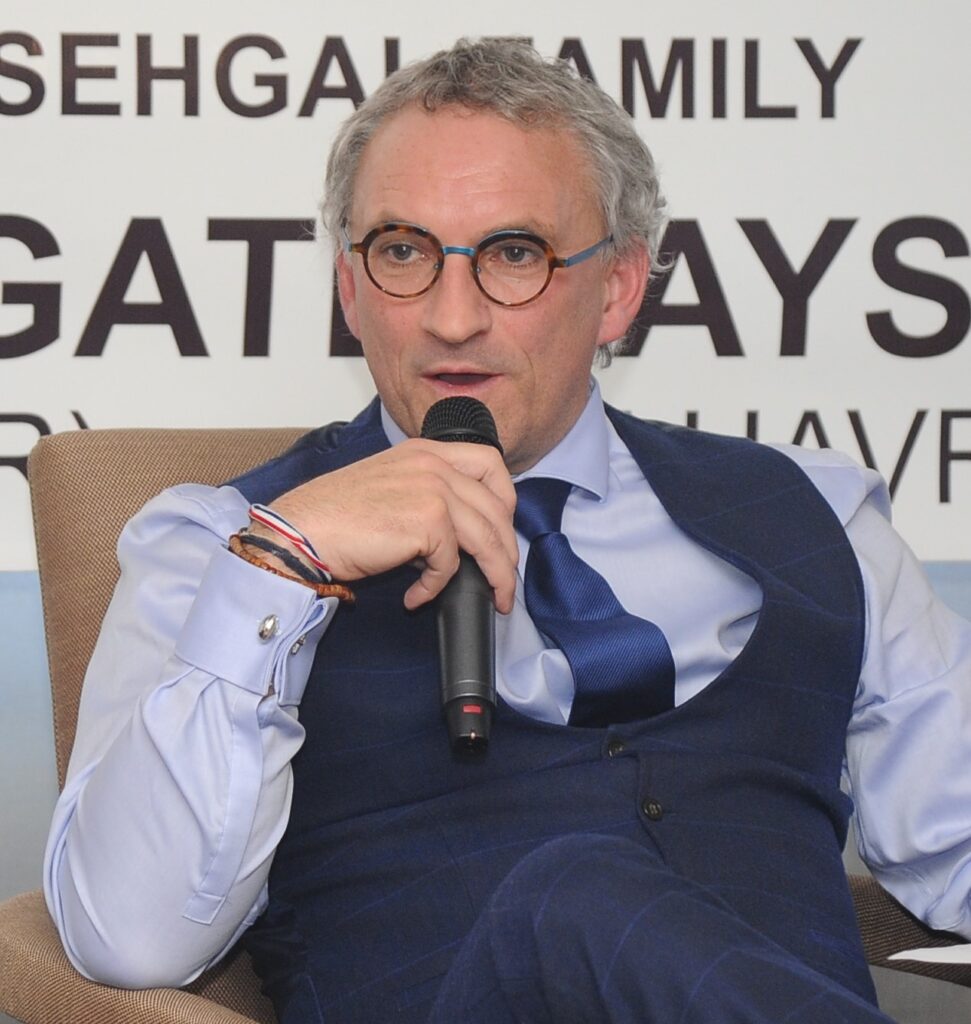
Representative of Le Havre University, Mr. Yann Alix: I’m Yann Alix, I am a Doctor in Geography and I am the General Manager of a think tank in France called SEFASIL, which has been launched almost a decade ago by the Port Authority, and we will discuss today about how Pakistan would be the next door for us and I will explain why.
I cannot initiate my speech without expressing my deepest and most sincere thanks to Mr. Sehgal. Thank you Mr. Sehgal for his confidence in the SEFASIL foundation and its general delegate, that I am. This opportunity is truly and historically unique and constitutes, I guess and I hope so, the beginning of a great and wonderful intellectual and human Journey. This would not have been possible without the involvement and commitment of the French Ministry of Foreign Affairs and more particularly Mr. Yves Manville.
Yves Manville is a special man who knows how to create bridges to connect the right people at the right time on the right place like today, thank you for that, Yves. I guess that we particularly need these crucial moments of exchange and sharing as the pandemic crisis since 2019 and of capitalist nomadism into a form of political perplexity. Nation states and their leaders are learning that cheerful and profitable globalization can disintegrate very fast due to the combination of phenomena which have only few links between them.
Consumers confirm, that energy is and will be one of the key factors for tomorrow world domination and the population learns that, logistics is not simply a support service for production, distribution, consumption, but the complex organization that shapes our lifestyles.
Since 2011, the SEFASIL Foundation as represented today has been anticipating through its prospective and strategic analysis these trends that are reshaping the world. As I said before SEFASIL has been initiated by the port of the logistics community of Le Havre in France with the objective of supporting and developing applied research in logistics, cost and maritime. SEFASIL has published more than 15,000 pages absolutely free of charge, you can download that on our website for free.
This French think tank has published 25 books with the support of more than 400 plus experts around the world, including 72 plus countries, so we work on the five continents, but we are here today because Central Asia has become one of the most active regions of our network.
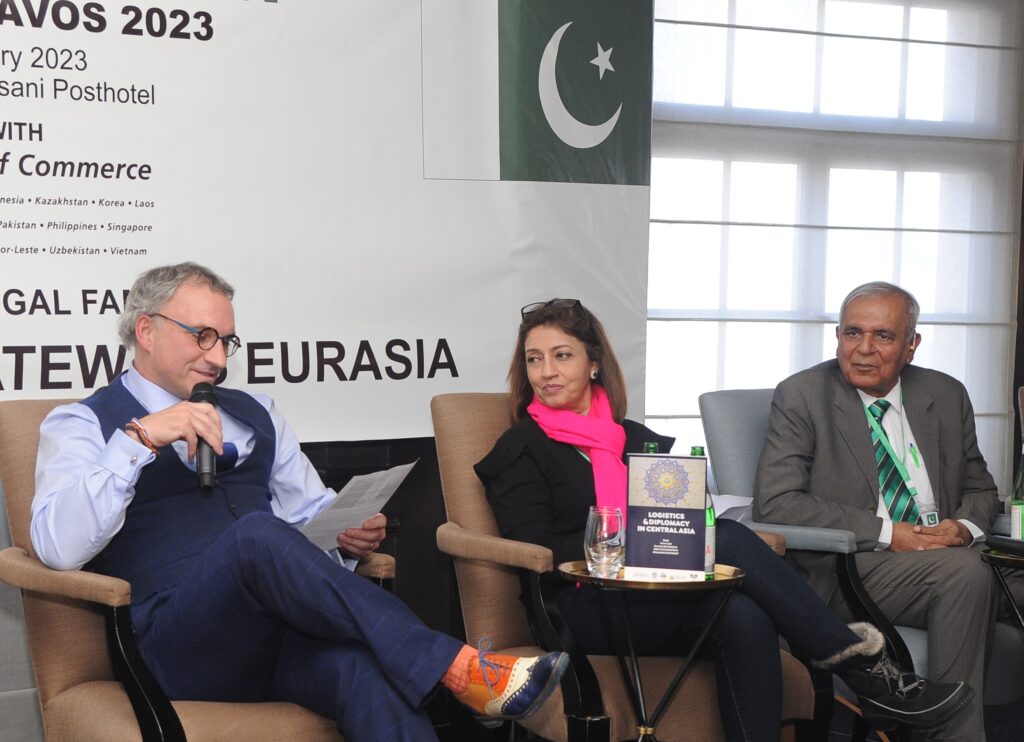
Since the launch of 2014 working group in Almaty, Kazakhstan under the leadership of two exceptional professors, we have discussed the logistics and diplomacy. Logistics and diplomacy appear immediately as intellectual evidence to debate in a multi-disciplinary approach of international relations and regional dynamics. We also discussed about the condition of cooperation and transport networks. We focus more and more about information exchange and cross-border management. We also deal with historical legacies and ideological perceptions, which is quite related in that area of bilateral and multilateral ambition and so on. With conferences and seminars at every year in Le Havre, Almaty, Ulaanbaatar in Mongolia, Bishkek, Tashkent, next week in Dushanbe. We will have the great honor to be in Dushanbe soon, thanks to Mr. Sehgal and his friends in Islamabad and Karachi, we are together crafting the public decision in logistics that remain the art of our work.
The logistics and diplomacy couple constitute a challenge, because it requires thinking of new methodologies in order to evaluate all the processes and the actions that contribute to building, structuring logistics, infrastructures and services in your own territories. The objective is to provide knowledge and know-how that will become useful to political decision makers responsible for future national logistics projection in Central Asia.
This prospective and strategic activities are established in the field with fruitful and intense dialogue with all the stakeholders and shareholders from the public or the private side. The SEFASIL Foundation has been invited today because we believe and we share that belief with Mr. Sehgal, in the importance of academic and scientific cooperation in the service of politics, society, economy and logistics.
SEFASIL will soon be in Pakistan to extend the scope of the Asia Europe Research Network, with aims of implementation of practical and pragmatic solutions, under the supervision of Pierre Chabal and many others.
We will publish the best Pakistani experts and it’s going to be the volume two of the book we have already released and we will get it all that expertise for feeding the thought, until the case of the Port of Le Havre is not only dedicated for the central Asia experts.
We are creating bridges between cultures, and between knowledge; and I do believe as a representative as well of the port of Le Havre, the main gateway for Central Asia as well as for the American continent because we are the last port to come when you leave Europe, and we are the first ones to come for the ships coming from Karachi or Gwadar, and I hope that you will collectively share my thoughts.
We are together today consolidating the link between France and Pakistan. The supply chain future connectivity between Central Asia and the Port of La Havre. Moreover, and I would conclude by those words, ‘finally the friendship between people motivated by the advancement of humanity’. Many thanks for your kind attention.
Dr. Huma Baqai – Rector, MiTE: Academic collaboration for countries like Pakistan where transfer of technology happens is critical. It’s critical for perhaps you and it’s critical for us, because in this fragmented world, we need academicians and the civil society to come together to make sure clients do not become gaping holes, so thank you for your talk and may I now invite the third person from Le Havre University, Pierre Chabal.
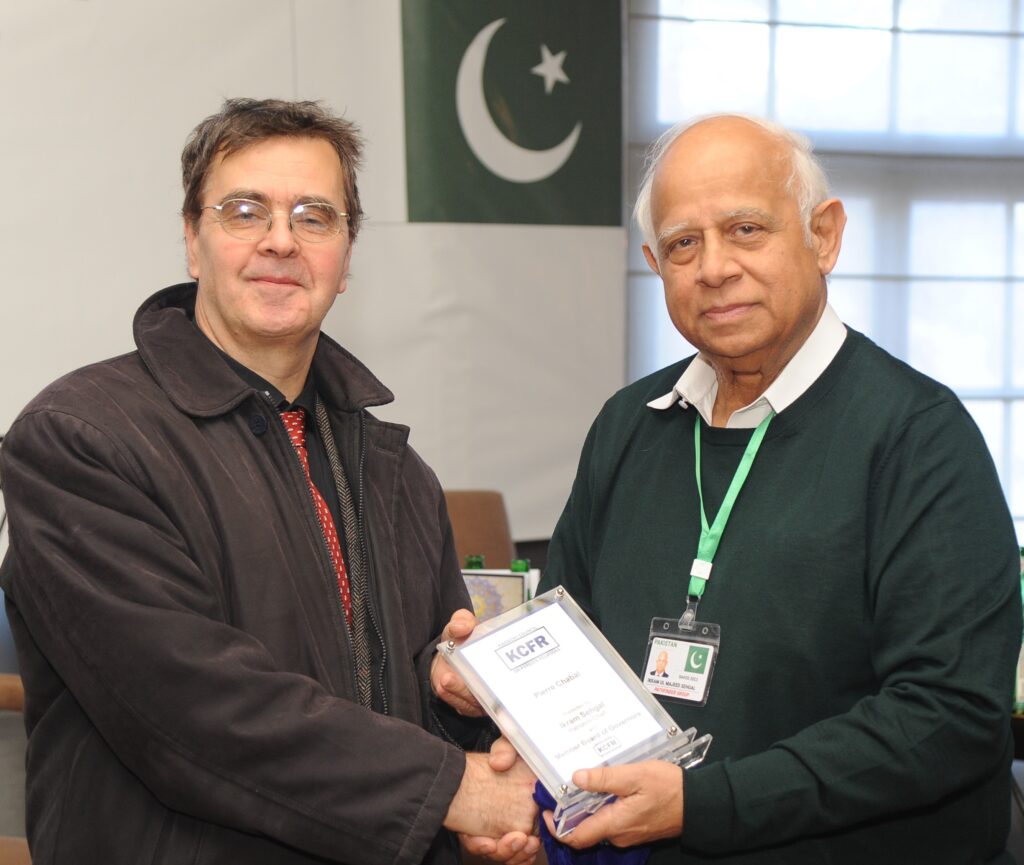
Representative of Le Havre University, Mr. Pierre Chabal: So my name is Pierre Chabal, if we must introduce ourselves. Thank you very much. Dear Sir and host, Ikram Sehgal Sahab, I come to you today as a Frenchman born in the 20th century in Western Eurasia, addressing you in Switzerland in the (still) early 21st century, about Eurasia? What can I say that, may be more than my expression of admiration to you for making this DAVOS meeting possible.
My task is made all the more difficult since I am just a simple academic, at one remote from the whirlwind of active politics and executive decision-making elites. During my West-European life, I have acquired a few diplomas and their ensuing illusions that I was acquiring knowledge, indeed that I had gathered knowledge. I passed – one after the other – from primary school to an active directorship of a research center – a number of stages based on – so it seemed – acquiring knowledge and on acquiring – would-be – capacities to perform duties.
That was largely before I began travelling extensively in Eurasia, from France to Korea and Turkey, then to Mongolia and Kazakhstan, China and Japan, Russia and Malaysia, Uzbekistan and Kyrgyzstan, all the while “hopping” from time to time to other European and Atlantic countries.
My gratefulness is therefore immense toward you people from Asia, my colleagues in East-Asia and Central-Asia for making my enlightenment possible. Is “enlightenment” too strong a word? Yes, if you think that I consider myself as enlightened! But no, if you accept that – as is the case – I consider that I was exposed to the bright and brilliant radiations of Asia-based suggestions of what I am.
Of what I am, as a French, and what I am vis-à-vis Eurasia at large. It is in this capacity, as a thick-headed “frog” exposed to the splendid minds of the East, that I have learnt so much.
I first encountered the hiatus of being exposed to the nomadic minds of Asia, whereas the sedentary minds of the former nomads of Turkey and Korea or the moving minds of the still nomadic spirit of the Mongols, the Kazakhs and the Kyrgyz. I learnt how relative can be what we hold as certain, that my western views were mostly inadequate, for instance when it came to such a deep-structuring concept as “time”.
Time structures the western mind, so much so that the CLOCK has become the symbol of capitalist constructivism. Whereas I was exposed, first in Mongolia, to a very simple truth : what matters if less WHEN than WHAT : for instance if a friend comes late to a meeting, what matters is not that he shows up after the time indicated but the fact that friendship makes him show up at all.
I believe that in ‘the West’ we have lost something that is still present in ‘the East’, namely we have lost to “immediacy” what ‘the East’ treasures as the “open future”. In the West, we want, we achieve, we forget. In the East, you hope, you cherish, you remember. That is a marked difference. A difference probably as great as that between Nomadic nations, that always were the best conquerors, and the sedentary nations that often proved more dedicated administrators.
Let me end on differences. Do they make it impossible for Eurasians to construct their future together? No, but provided that the mind remains open to the fact that the differences we see in the other are beautiful! and that they are a source of constant betterment for SELF! The concept of Eurasia is doomed if it consists of “the confrontation of differences”. The concept of Eurasia is a powerful force of the “Long History” – l’Histoire Longue – if it consists in the preliminary acceptance that the other is the precondition of the realization of the Self. For your elegant and kind attention, thank you very much!
Dr. Huma Baqai – Rector, MiTE: May I now invite our next speaker, our very own Ambassador Aisha Farooqui. She is serving in Ireland right now. My interaction with Aisha, goes a long way back. I would ask her all the provocative questions on television and she chose never to answer me. She was very good; fantastic Diplomat; she got away every time, but what I really want to tell you about Aisha is that has been working quietly for Pakistan for many years. She’s one of the most celebrated women diplomats in Pakistan’s Foreign Office and she’s also working to promote the sole concept of Eurasia and Pakistan’s role in it. Pakistan has the distinction of being a zipper state, a print state and I still think it has the golden chair. So Aisha, I’d like you to elaborate upon is that, we were largely akin to SCO, the Shanghai Corporation. Is Eurasia a step forward? Is it more happening? Is there potential, because it’s huge, it’s almost like a paradigm shift and is their potential? Can this really happen? So over to you Aisha.”
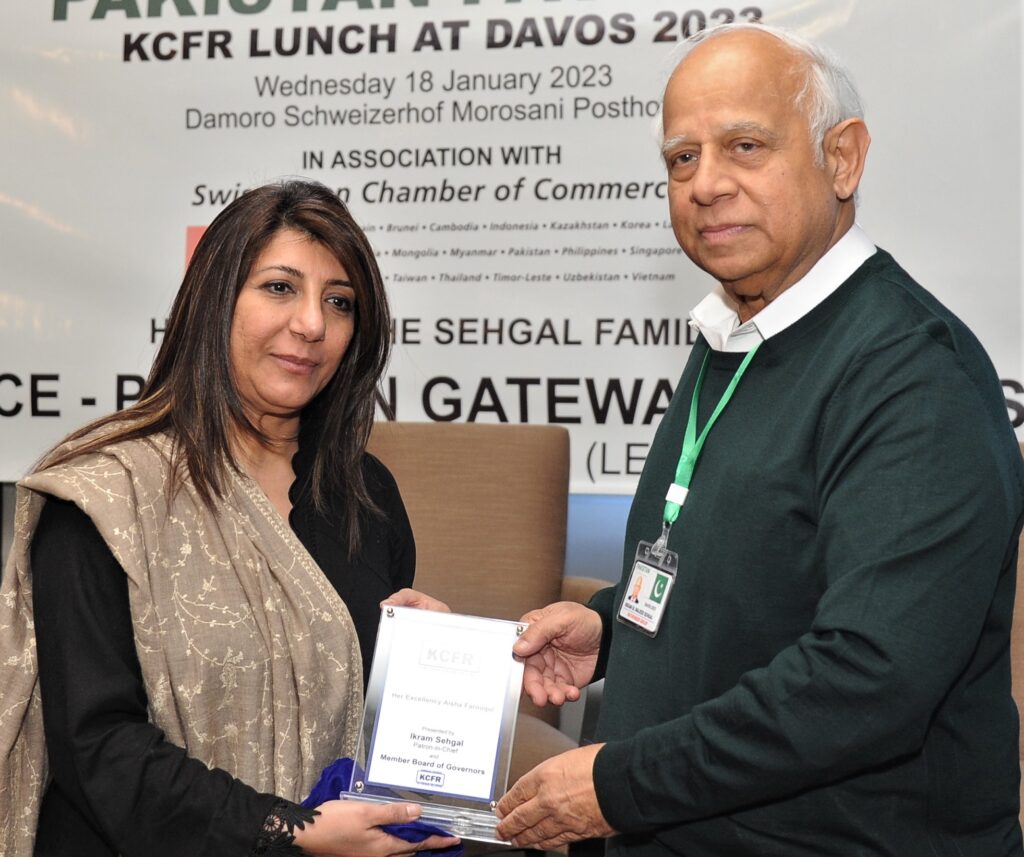
Ambassador of Pakistan to Ireland, H.E. Aisha Farooqui: Thank you very much Dr. Baqai for a very warm generous introduction. My thanks goes out to Ikram Sahab and of course KCFR for inviting me. It’s an honor to be part of this conversation. I have some prepared remarks because I thought the subject is important and serious enough to devote some serious reflection on what we mean when we talk about Eurasia and Pakistan’s role and placement. I think the dialogue of Eurasia initiative makes an important contribution to the contemporary global discourse on the unfolding geopolitical order. It is of great interest to all of us in our different capacities as policy makers, academics, businessmen and citizens of these regions who desire peace, progress and prosperity for our nations. Most of us agree that contemporary geopolitics is characterized by instability and chaos. The old order that had been established in the post-soviet era is now in transition. What will the new order look like is unclear. However, what it offers is the potential of either great creativity or great crisis.
New centers of power are emerging and we are all familiar with that conversation, be it China or Eurasia thus, multi-polarity is likely to be the new norm. As you may be aware, that Eurasia refers more to a political and cultural construct that seeks to find lines of geographical convergence between Europe and Asia, rather than neatly define geographic space. Along these converging lines Pakistan finds itself in the heart of the Eurasian region, geographically, historically, culturally, and civilizationally, Pakistan is a part of the spatial continuum that we call the Eurasian Heartland.
Since ancient times, the ethos of the land that constitutes contemporary Pakistan is characterized by qualities of tolerance, generosity, hospitality and connectivity for travelers and traders. These values are intrinsic to Pakistani culture. It is therefore no surprise that Pakistan finds itself, as an important member of the Shanghai Cooperation Organization, or SCO. It has close political and economic relations with the Central Asian countries and all whether strategic partnership for China. Pakistan’s membership of SCO is a natural and logical corollary of our geo strategic relation.
In the past two decades since its establishment, the SCO has carved a niche for itself in the pantheon of modern multilateral organizations, and has become an important transfusion of organization. Today, it arouses core interest on curiosity from those that are within it and those that are watching from the outside, so we just wanted to give you a few statistics. Cumulatively, SCO member states comprising China, Russia, Pakistan, India, Kazakhstan, Uzbekistan, Kyrgyzstan, Tajikistan Iran and Belarus as full members comprise phenomenal resources of oil and gas, minerals, precious metals, food, grains and a technologically advanced human resource. Altogether, SCO is home to 41% of the world population and brings together 23% of the global GDP. According to one estimate, SCO comprises, a 22 trillion economy altogether. Intra SCO trade is over 400 billion, out of this China’s share is 40%, Russia 28%, India 20% Kazakhstan 8%, Pakistan about 4%, followed by Uzbekistan, Kyrgyzstan and Tajikistan.
Beyond our region, Pakistan has also long enjoyed a strategic partnership with European countries and the EU, individually and bilaterally. With EU, we celebrate 60 years of partnership. It remains one of our largest trading and investment partners and we share common values of democracy, rule of law, governance, human rights and free market economy. The strategic partnership with EU countries has yielded positive results for both sides, especially in the economic domain, where the GSP plus arrangement over the past 10 years has helped both sides progress economically.
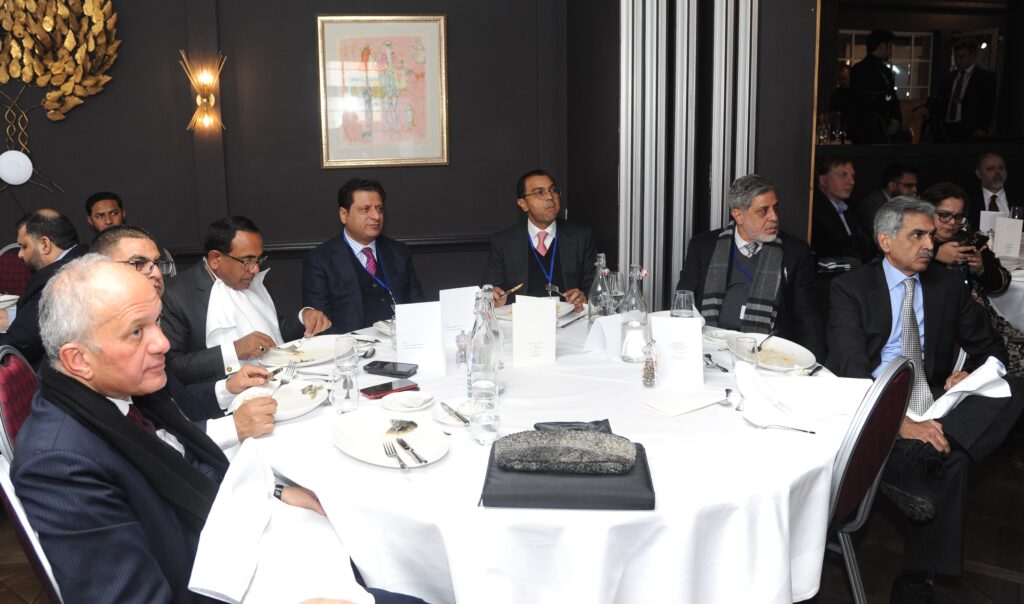
Ladies and gentlemen, diplomacy in my view, is truly the art of connecting people, cultures and countries, and Pakistan offers that space as a bridge to connect the two parts of Eurasia to Europe and the Asian Parts, thus, our participation in the BRI and SCO as well as our long-standing relations with the EU are not mutually exclusive. These are times of multiple crises, of poly-crisis, as we learned this morning, of which climate change and disruption of the global supply chain are the two biggest and most urgent manifestations. These global challenges require global responses in a multi-polar world. Pakistan in principle does not believe in politics and we think that the era of Cold War divisions is long over.
In recent times, as you may be aware, Pakistan has also been described as the great connector. In a recent piece in the Atlantic Council magazine stated, that at the crossroads of the abundant resources of Central Asia and the Middle East, and the lucrative markets of China and India, Pakistan has the potential to play a significant connecting role that enables broader racial interdependency, while boosting domestic economic prospect.
I’m also very heartened to learn about the partnerships and academic exchanges with universities in France and Pakistan, that are at a nascent stage, but will go forward further as we develop this dialogue on Eurasia. Academic exchanges and capacity building of Pakistani youth, supply chain management and logistics management would be a useful and practical form of the objectives and efforts of the Eurasia dialogue. I believe it has the ability and the possibility to become a forum for advocacy and a platform for practical tangible action, whether the climate action or to deal with logistics and diplomacy as explained very well by Alex and Pierre and Mr. Castorio.
I also believe that Eurasia dialogue, can be the springboard that springs forward as it evolves and moves. A discussion and a conversation between women leaders in Eurasia and the presence of strong leadership, women leadership, from Dr. Bakai and I also want to recognize the Farkhunda Naderi, former member of Parliament from Afghanistan, who’s with us today, that women bring a different style of leadership, that seeks to find unique solutions to common challenges, and I think bringing together women leadership in Eurasia together to deliberate on the common challenges that this region faces, would be an important task forward for this Eurasia dialogue. I think I’ll stop here, thank you very much.
Dr. Huma Baqai – Rector, MiTE: Women leadership it is and you can’t have a discussion on Eurasia and its potential without a view from Afghanistan, so I have the honor and pleasure of inviting Ms. Farkhunda Naderi to the podium. I and Farkhunda, also go back.
We both were a part of Track 2 diplomacy between Pakistan and Afghanistan and it is more women like Farkhunda, who should be on decision making tables and their corridors of power, so a view from Afghanistan on Eurasia. Farkhunda, the floor is yours.
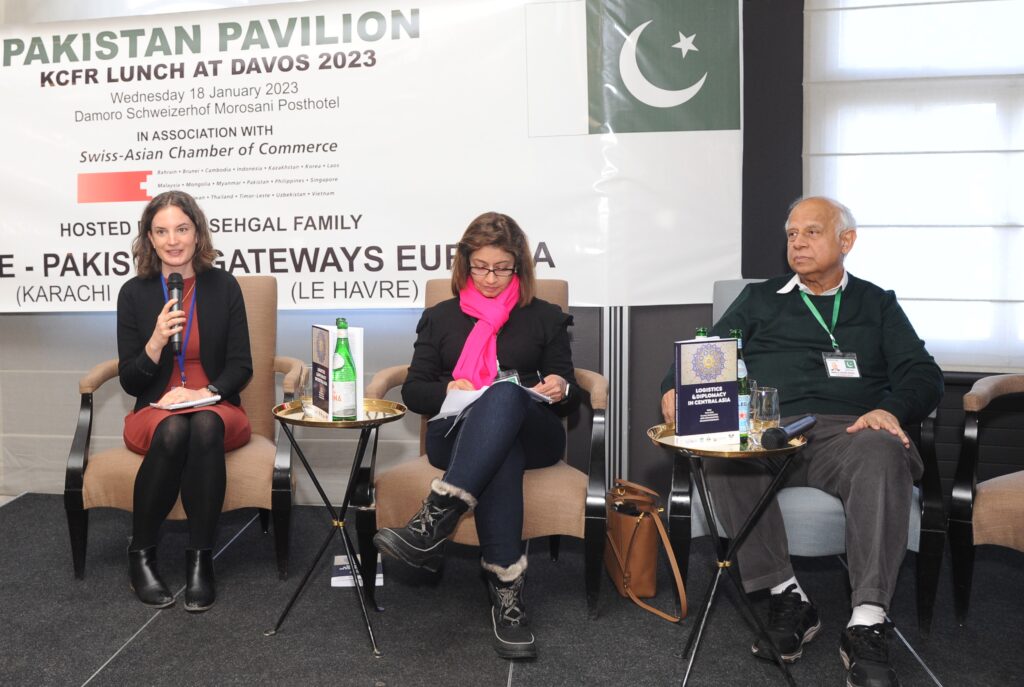
Member HCNR, Afghanistan, H.E. Farkhunda Zehra Naderi: First of all I’d like to thank Yves. As described by Alex, that he is the person who is connecting different people in the right place. A European person, a good friend of Asia, that is coming to a dialogue of Eurasia, and after Yves, I would thank Professor Pierre for getting me involved in the Eurasia dialogue, to reconnect me back to our own region and that takes me to thank now, Mr. Sehgal for his kind invitation.
I’m happy to be in this dialogue design. I’m here as a citizen of Afghanistan and it’s very important that we have to keep thinking, talking about the citizenship and I’m looking forward that soon we are going to have a representative of Afghanistan, especially from parliament of Afghanistan to represent the people of Afghanistan, especially the brave women of Afghanistan, who are inside the country right now.
It’s not the resilience of women like me, but of the women of our region and to the women of the world, and I’m looking forward to that day that such a discourse would go back to our country, to my country. I want to say our country because I think when you’re going to politics and you say too much me, then you get the ownership from others; so I want to keep reminding myself even though we are all selfish and we do this and from subjective perspective, that we want to go to objectivity, but it’s important that they contain this discourse to the parliament and to take it to different parts of Afghanistan.
The same thing goes to Pakistan, to all of our region, our neighborhood, that it has to start from the local to national to regional and to the continent, and I’m happy to have the correct definition of continent I believe. That man-made definition of Eurasia is the correct one that it’s all one, and it takes us to the accepted notion of the UN Charter and the values that we talk about.
Regardless of our differences, regardless of our diversity, we all have values and we can work for those values through diplomacy, exchanging culture, business, services and I think for the countries like Afghanistan, we really need to build on the infrastructure and that can be done only through connectivity. You know that in your neighborhood, Afghanistan is the land locked country. but at the same time it’s a crossroads. It’s a crossroad, that I personally believe, there is no Eurasia, there is not Europe or Asia, and there’s no Asia, if there is no connection between South Asia, Central Asia and going to the East and bringing all together to really talk about this term that we use as a verb, to define it through the existence of our citizenships.
I’m so pleased to say that we all in this landmarked location have started some of the projects. I can talk about CASA-1000, I can talk about you know Total, Lazuli corridor. These are the parts, that it’s got started but, we need to move forward and complete our mission. I think the mission can go to the government, to the citizens, to different policy makers. It’s a combination of all groups working together, and I know as I mentioned that Afghanistan right now is in a very complicated situation, but one of the things that teaches us from history is that there’s this resilience.
I’m very thankful for the magazine that was given to me by Mr. Sadeed, and the article that he wrote, I really liked it. The part that he mentioned about South Asia that it’s competitive, and I believe we have a region of very ambitious people and now we have ambitious projects and I believe if we give the right tools to our people and citizens, through their competitiveness, they can get the highest level depending on what kind of tool we give them.
Now we have these ambitious projects, Central Asia and South Asia and Eurasia together, that I’m hoping, we use the potential of our human resource to bring better services, better goods and also connectivity of people-to-people, and I’m looking forward to see that we can have a very safe neighborhood in our region. We can talk about ideas, services rather than fears, challenges and today I actually had a question and I’m taking this opportunity to put that question forward.
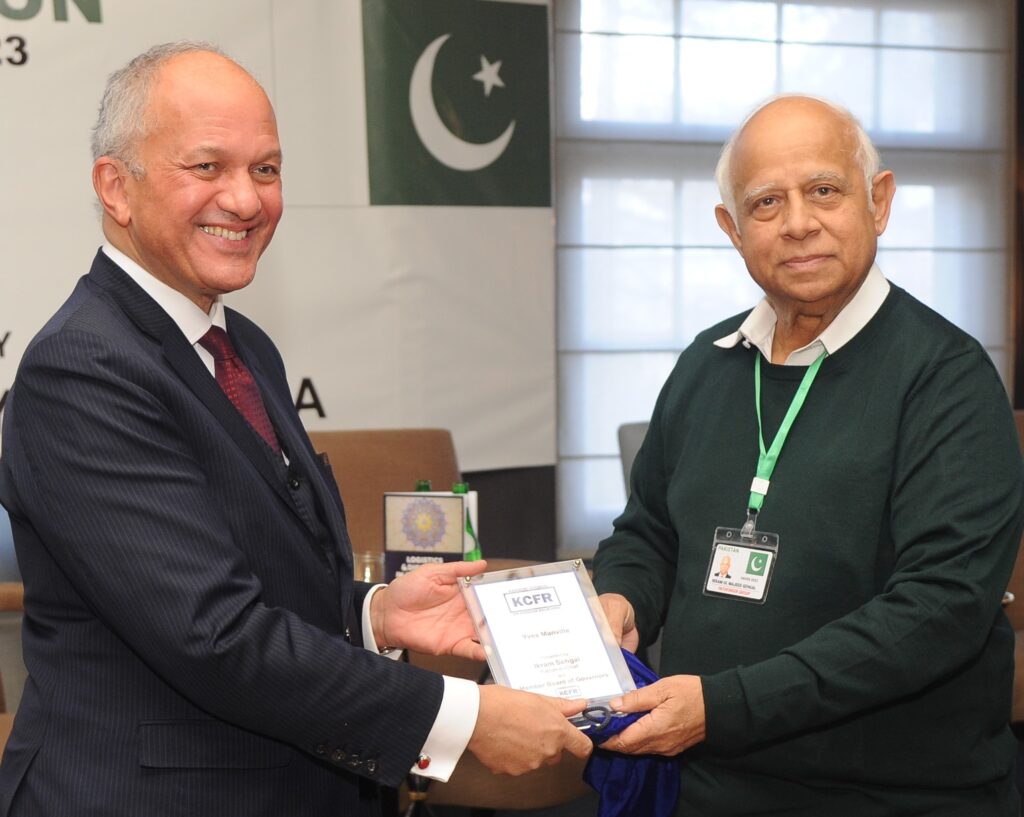
Minister Sherry Rehman actually made a good point today about the climate change crisis, and I really like she highlighted and made everyone responsible in the room. We shouldn’t put everything on God, because you know I think God would just look at us, and say that why did I create you if you put everything on me, so she made it very clear, that it is man-made so I can say human made first, but especially by men I suppose, and I just wanted to say today that I’m sorry to say this since, the room is dominated by men I allow myself to say this, if it was dominated by women I wouldn’t do that.
Since it’s dominated by men I have to say that there is more crisis created by men, so I agree with what she said today. We have to work together to overcome this crisis and I personally believe this is true. We have to work on the local level. We have to work on the national level. I as an Afghan before going to any place, I want to put the first pressure on me as Afghan and on us as Afghans, and then we go to other elements.
Then we have to have regional connectivity. If we don’t have regional connectivity, it’s impossible that we can go to the global level. That’s why I wanted to ask her, that I agree with her but do we have any regional program to overcome these problems, because let’s not forget, such a flaw adds to poverty.
33 million as population is huge and if there’s no immediate relief, we know that we are close to extremism and terrorism, and we know that all the citizens are the victims, but especially women. I am not here to victimize women because I already mentioned to you that the women who are inside my country, they are the token of hope to any level that you can take it, but we have to talk about security.
Insecurity doesn’t have one dimension, it’s got different dimensions so through this connectivity, how we can connect ourselves better? What are the lesson learned? If I don’t have lessons learned and forget everything about the past, I’m going to repeat the past again. To go through a constructive dialogue and to be more successful, we need to really work through our lessons learned, because I know Afghans are so ambitious and I know that our neighbors, Pakistani people, are very ambitious, and then if I go around the neighborhood of Afghanistan, we are all ambitious, but we need to use this ambitiousness.
We need to know that our next generation is not going to repeat what we did, and we are repeating what our previous generation actually did. The world has changed. It is not 21st century but it’s also the second decade of the 21st century, so anyways I’m going to stop here, I took this opportunity to actually cover my question from that time as well, thank you for your attention.
Dr. Huma Baqai – Rector, MiTE: More power to women in Afghanistan, more power to women in Pakistan and more power to women. We need to be in decision making, on decision making tables to make this a better world, so thank you for that, Farkhunda, and with that I am going to get a view from the United States on the discussion that has just happened, so I have the honor and pleasure of inviting Ms. Elizabeth who’s the Director of South Asian Affairs at the Stimson Center. So let’s hear what she has to say about Eurasia.
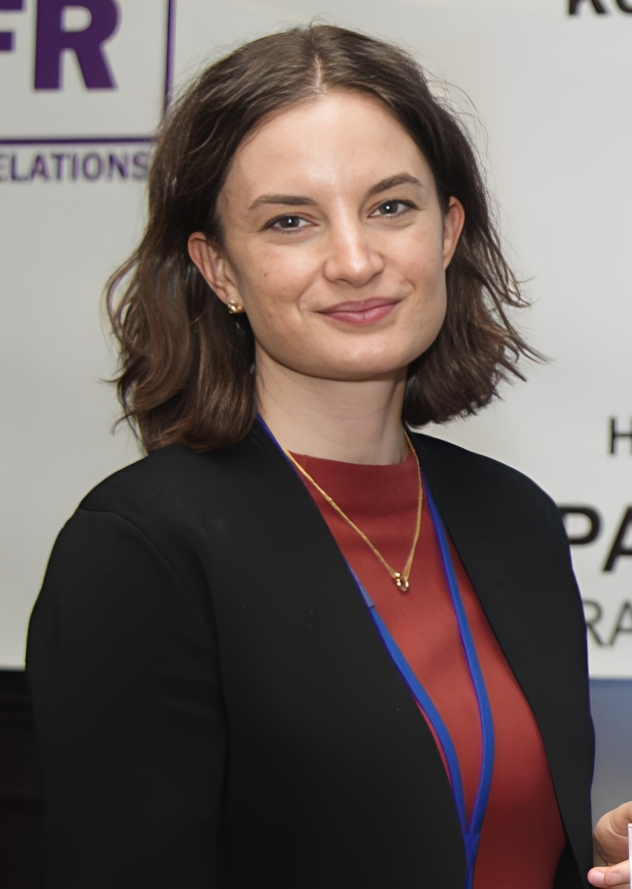
Director of South Asian Affairs, Stimson Center, Ms. Elizabeth Threlkeld: Thank you so much! It really is a pleasure to be here, I’m grateful for the invitation. Thanks to the FACC, to KCFR and of course to Mr. Sehgal, the founder of the event today, thank you very much!
I don’t know if I can operate US view, but from the relative view of Washington DC perhaps. Thinking about how the world has unfolded over the past 12 months or so, we’re coming up on the one-year anniversary of the invasion, which to my mind is an event that we are only starting to see the impact of, and what I was thinking today about.
Eurasia. It’s a really big concept but central to it in my mind is how the reverberations from Ukraine are likely to evolve over the coming years. I think, maybe in the context of this conversation, there’s some good news but some storm clouds on the horizon as well, but it’s wise to bear in mind because as you all and others are interested in encouraging trade building connectivity, obviously those are dynamics that you’ll have to grapple with as well.
As I see it, Eurasia is a region, particularly Central Asia, perhaps a slightly more expansive version thereof, it’s traditionally been Russia’s sphere of influence. This is an area where Russia has dominated as a security provider. It is a post-Soviet space and we’ve seen examples time and time again since the Russian invasion, where Russia has been less capable of playing that role. Meanwhile other entrants are fighting the right into South Asia or excuse me, into Eurasia, and so that time of flux is something that we will all need to grapple with as we think about trade and connectivity in the years ahead.
So a little bit more specifically, what has changed in terms of Russia’s role in the region again, it’s early days. We don’t know how the war in Ukraine will play out. To my mind Russia will emerge weaker from the conflict. The question is how much weaker and in what ways and what does that mean? So we’ve seen these symptoms already, where Russia is desperate for troops to add to the conflict in Ukraine has actually withdrawn its troops from places like, Tajikistan, Kyrgyzstan, Armenia, Georgia as well, so less military presence on the ground and I think overall that is a trend we’re likely to see continue, and with it we remove that lid if you will from the region of as a net security provider.
There is liable to be some flux and indeed we’ve seen that just over the past 12 months, so look at Armenia and Azerbaijan. Russia actually received quite a bit of praise back then, but Russia has not been able to step in and enforce the agreement that was reached, I think that’s something that would have been a different story had we not seen the invasion of Ukraine.
There was that negotiated agreement but I think going forward, we saw the program earlier last year in Kazakhstan where Russia did actually send troops, but a sign of some of kind of societal pressures that sprung up across the region, it seemed likely to continue with these shifting winds. Likewise, border skirmishes that have played out between Tajikistan and Kyrgyzstan, there is a disputed border between the two and these are areas where again, Russia’s role as a net security provider has traditionally helped to keep a lid on things, even if not with all the underlying source of the conflict.
Lastly, we were just hearing of course about the situation in Afghanistan and the Taliban regime has created problems not just internally but at this point, all of its neighbors, unfortunately, Pakistan has seen all too well through the impact of the TTP, so to my mind that is a range of issues that is unlikely to revolve itself smoothly in the near term and in fact we might see additional conflict in the year ahead.
With that though, as you remove some of the Russian influence, not all of course, but it diminishes. We are seeing states like Turkey and Iran and China come to play a greater role in the region. I think to this we could also add the EU as a bloc though perhaps, that gets a little bit less attention. We’ve seen Turkey’s influence and what’s playing out in Armenia and Azerbaijan, Iran with its weapon sales, I think is becoming a greater player even as it faces protests at home and then China. Even as Russia and China inked the so-called No Limits Partnership back on February 4th of last year, I think we’ve seen a growing power imbalance between the two. I really found it notable that after years of Covid lockdown, Chinese President Xi Jinping made his first foreign trip to Kazakhstan of all places, the heartland of Russia’s sphere of influence in Central Asia, so I think there’s likely to be some competition between the two in that space in the years ahead, so again this is a moment of flux.
With flux comes challenges but also opportunities, and to my mind that makes it all the more important to invest in regional trade, regional connectivity, to ask as something of ballast, against these broader challenges that are coming up on horizon, but with that, we need to be realistic about what’s possible about the threats that are out there, because otherwise, it could be a recipe for unrealized expectations.
I think the last thing that I will add is, we talk a lot about Eurasia but it’s also important to look a little bit closer to home, and my hope is that this broader push for connectivity, I will see Pakistan looking not just to its North and to its West but to its East as well, where there is massive opportunity and massive market. I know there is a lot of challenges there too, but at this moment, where so much of this course focuses on de-globalization on near shoring, on fringe shoring, choose your term, to the extent that those in this room are interested in pushing against that grain. There is opportunity to be found both near and far. Thank you!
Dr. Huma Baqai – Rector, MiTE: I will now invite Yves Manville as a private individual not as a diplomat. He is a former diplomat but just to go into a little more into what you just said, we look towards the west and want to resolve that all the time. Despite all the problems, the dialogue remains on the table and only day before yesterday Prime Minister Shahbaz Sharif, offered talks to India yet once again, so Pakistan is now actually looking for functional relations with all its neighbors because the thrust is towards geoeconomics, and not geopolitics, so thank you so much! Over to you, Sir.
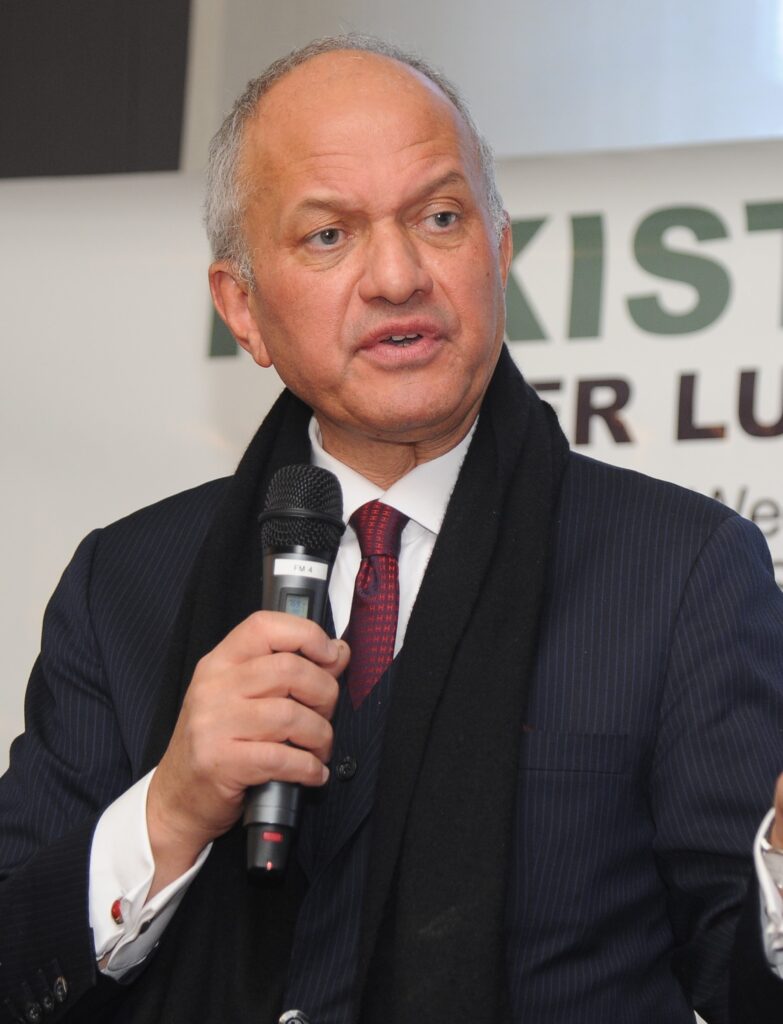
Former Deputy Chief of Mission of France to Pakistan, Yves Manville: Thank you very much Pathfinder Group and I’m talking in my individual capacity. I want to thank you all and especially Ikram Sahab, and the people who came from France, Le Havre, University of Le Havre, to produce together this promising event, and we made a party of friends and the people who are going to work together, Pakistani, French, Afghan, etc.
I wanted to come back on something that you said this. Back in August, I was still at the embassy as an Ambassador in Pakistan and we got a call from Paris and President Macron was coming back from Algeria and in his plane, he asked about two crises, one was Ukraine and the other one was the Pakistan floods. Why those two, because it’s not only about Ukraine and Pakistan, it’s a world crisis, and Pakistan like it was said very well this morning, it’s not only about Pakistan, it will not stay in Pakistan it’s the whole world’s concern, and France was the initiator of this idea to have a special conference in Geneva.
President Macron spoke and discussed about it with Prime Minister Shahbaz Sharif in New York and also France sent teams of people, on the ground. Soldiers, private brigade, doctors, medics. They went where the floods were happening and back in France, they campaigned about it because as she said it’s not only state to state, government to government, it must be decentralized cooperation. She spoke, Ms. Rehman, about NGOs, we have to speak also about the region and mobilize them in the region of France.
This is decentralized cooperation. Those people came from all provinces of France, on the ground, to bring relief and to bring technical machinery and there was a real proposition of the opinion in France about what happened in Pakistan.
I’m very supportive of what was said by Ambassador Farooqui as this operation dialogue. Let’s make it even more profound with concrete developments and also on this women dimension which is so important. Thank you for all and see you soon because we will go on with this celebration and dialogue around, initiated by Le Havre City.
Rector MITE, Ms. Huma Baqai: So thank you ladies and gentlemen for being such patient listeners. We’ve heard views from almost across the globe and just a few words that I want to say here is that Pakistan’s foreign policy has been about constraints and compulsions and we constantly work towards creating opportunities and options, though Eurasia is both an opportunity and an option, and how Pakistan wants to be viewed as a geo-economic state and not just a geostrategic state and how difficult it is for Pakistan to make that transition.
So our thrust is to have functional relations with all our neighbors, have a geo-economic thrust to our policies to get over the economic meltdown that Pakistan is struggling with right now, and floods have only added to the problem. Having said this, the potential that exists is unbelievable. Pakistan still has what I call the golden chair, the Russians call us the zipper state, we are a zipper state, which can bring these two continents together and un-tap the potential not just for Pakistan, but perhaps, half of the world, and we constantly talk about cooperation because in today’s world with climate change and other poly crisis, that you’ve been hearing about today, confrontation is not even an option and with that, I will request Ikram Sehgal Sahab to say a few words and capstone the discussion.
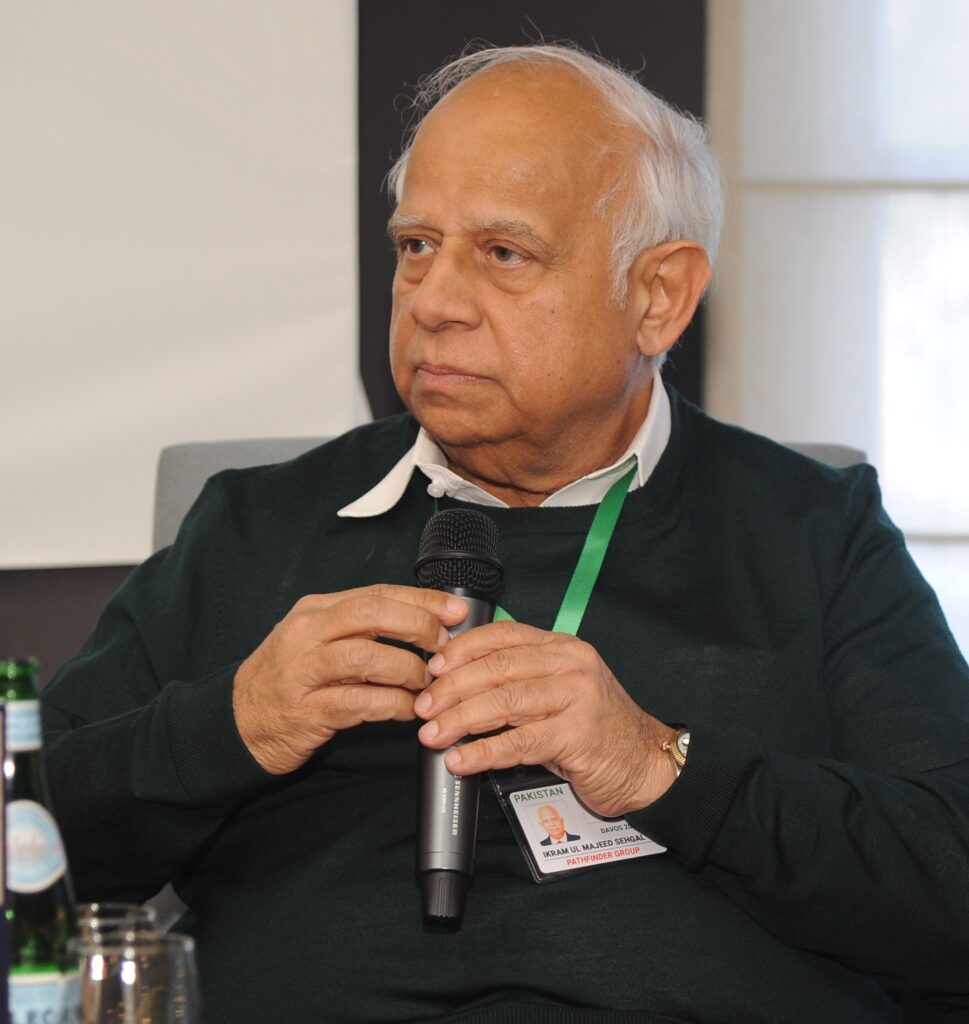
Co-Chairman Pathfinder Group, Ikram Sehgal: Thank you, Huma, and of course we are very thankful to have the three people from the Le Havre University, organized by our friend, Yves Manville here, Jean Noel Castorio, Yann Alix and Pierre Chabal.
This shows the importance of what we’re talking about and of course Elizabeth coming all the way from the States to give the perspective of the United States. Pakistan, although the part of South Asia, literally was denied salvation because of the Indian dominance of the region, so we became a country which is part of South Asia, but not a part of South Asia, which is supposedly part of the Middle East, North Africa, then not a part of it, or Central Asia which, of course, was a little as they say going a little too far, but we were a part at one time of the Baghdad Pact and then we became a part of CENTO and it became ultimately the Regional Corporation for Development and now Economic Cooperation Organization (ECO) and now we have roads and networks already existing which have to be upgraded.
Let me tell you, the Chairman today was sitting in the WEF Pakistan Breakfast with Mirek Dusek and he started with, I would say the persuasion of Mr. Bob Bradley, who will be the main factor, the CEO of the World Economic Forum, and they made Eurasia, a center of growth, and they made Pakistan, a part of that group, because they realized, it’s not a part of South Asia, it’s not a part of East and North Africa, Central Asia, so they decided to place it as a part of this new group, which played wonderfully for us.
We became a gateway to Eurasia and thanks to Yves, I was able to travel to Le Havre, and the moment I landed by train to Le Havre, Pierre helped me take my baggage to the hotel. I can never forget. That has made Le Havre to become something very special to me. You know dreams do come true, and I say we have this gateway to Eurasia, the Eurasian Gateway, which will develop in the future, I am sure, and we will be having something in Pakistan.




